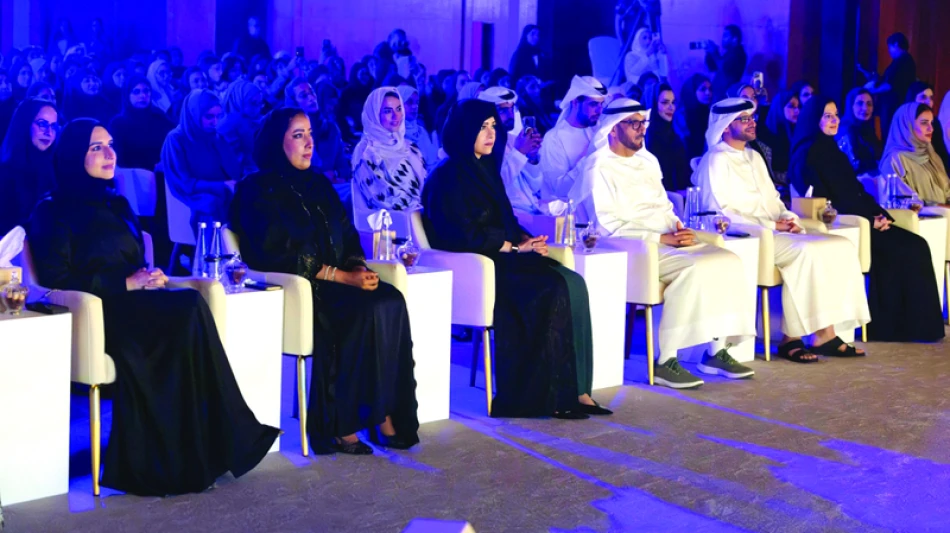
Emirati Women's Forum Celebrates Women's Pivotal Role in Driving Comprehensive Development
UAE Women's Forum Showcases Decade of Achievement in Leadership and Economic Participation
The Dubai Women's Establishment hosted its flagship Emirati Women's Forum yesterday, marking ten years of celebrating UAE Women's Day with over 700 senior executives from government and private sectors. The high-profile gathering, patronized by Sheikha Manal bint Mohammed bin Rashid Al Maktoum, underscores the UAE's systematic approach to women's empowerment across critical economic sectors including technology, space exploration, and sustainability.
A Strategic Investment in Human Capital
The forum, held at the Ritz Carlton in Dubai International Financial Centre, featured ten dialogue sessions examining the UAE's successful trajectory in supporting women across various fields. This wasn't merely ceremonial—it represented a concrete assessment of policy outcomes and future strategic directions.
Sheikha Manal bint Mohammed bin Rashid Al Maktoum emphasized that the UAE has granted women "complete opportunity to take their natural place in leadership positions and decision-making" since the nation's founding under Sheikh Zayed bin Sultan Al Nahyan. This foundational approach has yielded measurable results across sectors from aerospace to government administration.
Quantifiable Progress in Key Sectors
The forum highlighted women's leadership positions in vital economic areas including education, healthcare, technology, and space exploration. This strategic focus aligns with the UAE's broader economic diversification goals and its Vision 2071 initiative to become the world's best country by its centennial.
The presence of 700 senior executives from both government and private sectors signals institutional commitment beyond political rhetoric. This level of participation suggests that women's economic participation has become integral to the UAE's competitive strategy rather than a peripheral social initiative.
Institutional Framework for Sustained Growth
The Dubai Women's Establishment, operating for nearly two decades, has evolved into what Sheikha Manal described as a "national platform" supporting the state's investment in national competencies. This institutional approach mirrors successful models in Singapore and Nordic countries, where systematic policy frameworks have delivered sustained outcomes in gender parity.
Regional Leadership and Global Competitiveness
The forum's timing coincides with increased regional competition for talent and investment. As Gulf states vie for economic diversification, the UAE's early and sustained investment in women's leadership positions it advantageously against regional competitors.
The participation of speakers including UAE Ambassador to Finland and Estonia Amna Fakri, and various directors-general of key government entities, demonstrates the integration of women into foreign policy and economic governance—areas traditionally dominated by men in the region.
Next-Generation Leadership Pipeline
Notably, the forum featured Aisha Al Obaidli, the youngest Emirati chef, and Ghaya Al Ahbabi, the youngest UNICEF ambassador for COP28. This intergenerational representation suggests a deliberate strategy to maintain momentum across demographic cohorts, ensuring continuity beyond current leadership cycles.
Economic Implications and Market Perspective
For investors and multinational corporations, the UAE's systematic approach to women's empowerment represents both market opportunity and operational advantage. Companies operating in the Emirates can access a broader talent pool and benefit from diverse leadership perspectives that research consistently links to improved financial performance.
The forum's focus on technology and sustainability sectors aligns with global investment trends toward ESG (Environmental, Social, and Governance) criteria, potentially enhancing the UAE's attractiveness for international capital seeking markets with strong governance frameworks.
Strategic Continuity and Future Trajectory
The forum's emphasis on policy continuity—honoring founding principles while adapting to contemporary challenges—reflects institutional maturity rare in rapidly developing economies. This approach suggests that women's advancement in the UAE is likely to withstand political transitions and economic cycles, providing stability for long-term planning by both domestic and international stakeholders.
As regional economies face demographic transitions and global competition for talent intensifies, the UAE's systematic investment in women's leadership capabilities positions it to maintain competitive advantages across multiple sectors. The forum's success, measured by participation levels and institutional backing, indicates this strategy will likely expand rather than contract in coming years.
Most Viewed News

 Sara Khaled
Sara Khaled






